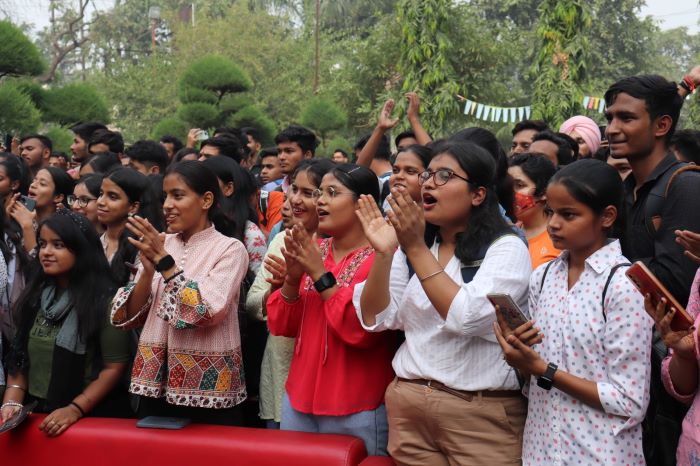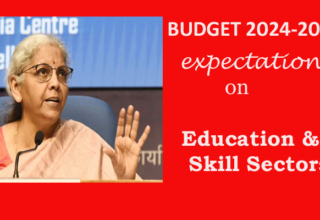
Year 2023 arrived building on the reprieve that 2022 offered from Covid pandemic and the resilience seen across the ecosystems. So, importance of mental health and wellness in school curricula continued so did acceptance of flexible learning pathways even though classrooms were back in strength and engagement.
Jitendra Karsan, Chairman Safari Kid India, feels looking back at 2023, the education sector witnessed a remarkable resurgence. “Preschools like ours were operating at over 90% capacity post-COVID. The heightened interest in franchising and increased parental inquiries underscore a positive trend. Looking ahead, the educational landscape is expected to evolve, urging primary and secondary schools to collaborate with specialist preschools for a purposeful foundation, fostering a lifelong journey of self-discovery. The future holds promise for an educational landscape that cherishes holistic development and embraces innovative partnerships for a brighter learning experience,” he adds.
From pre-schooling to study abroad, the student interest continued to grow on interests and strengths even as policy environment saw several milestones from National Curriculum Framework for school education to National Credit Framework (NCrF) along with entry of foreign universities.
According to Naman Jain, Director, Silverline Prestige School, Ghaziabad, primary education in India is going through a transformational phase. This phase and especially the developments of 2023 in regards to changed policy implementation would be considered instrumental in shaping up the future of Indian primary education. “The coming year, 2024 is expected to witness a tremendous shift with the Indian primary education system becoming more in sync with the global education scenario. These changes are extremely important for the benefit of students who will not be limited to education opportunities in India but be prepared for global education opportunities. Also, Integration of AI and other futuristic technologies will help NEP’s execution at both public and private level in K12 Education Segment.”
As the conversation shifted from ‘How can AI improve education?’ to ‘How can we ensure ethical and responsible use of AI in the educational context?’ The implementation of AI for exam evaluation and personalized learning is our recent innovation, says Dinesh Kumar Poobalan, CEO & CTO, Greatify. “As we bid farewell to 2023, the education sector stands at the forefront of innovation and adaptability, ready to face the evolving needs of learners in the years to come. The collaborative spirit, technological advancements, and commitment to inclusivity define the education narrative in this transformative year,” he adds.
Supporting this notion, Vinay Singh, Executive Director and CEO of Q&I and Thomson Digital, is of the view that Education technology has been a driving force, gradually transcending geographical and financial constraints. He says, “In 2023, we observed a significant turning point in the edtech landscape, witnessing a more nuanced amalgamation of technology and education. The challenge ahead is to sustain this momentum and ensure accessibility for learners globally.”
Dr. Mukesh Gandhi, Founder and CEO, Creative Synergies Group feels Edtech and e-commerce sectors will also double down on next-gen technologies to provide a personalized and frictionless experience for users worldwide. “Personalization will be elevated with productionized machine learning, analyzing intricate user patterns, gauging preferences, and tweaking their experiences accordingly. These trends could be instrumental in breathing new life for the resurgence of edtech globally.” Security works in tandem with digital overhaul, and the several cases of data breaches in 2023 have served as a reminder that security cannot be taken lightly. In 2024, businesses will seek out advanced technological support to establish hyper-secure environments across their devices, applications, and networks.
According to Dr. Himadri Das, Director General, IMI, in 2023, higher education underwent a significant shift post-COVID, merging the ‘new normal’ with established methods. Hybrid classrooms, employing advanced audiovisual tech, facilitated global interaction, offering the best of both worlds. Online education, now integral to executive programs, remained post-pandemic for convenience. Government approvals boosted online degree programs, leading to investments in synchronous and asynchronous content. The rise of Large Language Models (LLMs) and generative AI disrupted education, with tools like OpenAI’s ChatGPT captivating students while challenging faculty to promote critical thinking-based tasks.
Looking ahead to 2024, higher education anticipates tech advancements benefiting learners. Tailored LLMs and AI-driven learning will empower students in specialized areas, enabling self-learning beyond traditional classes. Advancements in AI and ML hint at a shift to flipped classroom models, offering students more independent learning opportunities while faculty concentrate on practical guidance. Exciting times lie ahead.
In higher education, demand for foreign courses, universities and destination continued to grow and about 7 lakh students are in process of going abroad for studies. As per Ananya Sachdev- Founder of Uni Discovery, there is a rising trend in applications towards Eastern European countries, such as Lithuania, Finland, and Sweden, owing to their affordable tuition, living expenses, and streamlined visa procedures even as the popular destinations of US, Canada, the UK, and Australia continued to be in demand. “
Additionally, there has been a growing interest from foreign universities in India, as the UGC has introduced the “University Grants Commission (Setting up and Operation of Campuses of Foreign Higher Educational Institutions in India) Regulations, 2023,” she adds.
Ashutosh BurnwaL, Founder & CEO, Buddy4Study says we have witnessed a surge in adoption of technology, driven by the pandemic’s push for online learning and a growing awareness of the potential of tech to bridge educational gaps as also scholarships. This year also saw a renewed focus on inclusivity. Ed-tech companies like ours are increasingly recognizing the crucial role they play in empowering underprivileged students and bridging socioeconomic divides. However, challenges persist. As we enter 2024, optimism prevails and we can expect to see deeper collaborations between ed-tech platforms, government bodies, and NGOs hold immense potential in revolutionizing rural education and bridging the urban-rural divide. “By addressing existing challenges and capitalizing on emerging opportunities: 2024 can be a year of transformative change for education technology in India, ensuring that every child, regardless of background, has the opportunity to reach their full potential,” he adds.
Dr (Prof.) Varinder Kanwar, CEO, NABET – National Accreditation Board for Education and Training while commenting on the 2023 trends says skilling and reskilling will continue to become a focal point in education delivery. “The trend which we saw in 2023 will continue to be seen in future in which creativity and flexibility will persistently influence the nature of education. Personalized and technologically enhanced learning experiences will become the norm in the upcoming years, meeting the demands of individual learners and a wide range of learning styles. Retraining and upskilling on a constant basis will be necessary to remain employable in a labour market that is constantly changing. Institutions and business partners will work together to create programs that are flexible and adaptable. We at the National Accreditation Board for Education and Training (NABET) remain committed to fostering an educational landscape that strives in the direction of imparting quality education through its accreditation programs, and capacity-building trainings across various institutions.”
“The use AI upended the traditional models of leaning, and ushered a new wave of pedagogy and personalized education. Online and hybrid learning models, popularized during the pandemic, continued to be a significant part of the education landscape. These models offered flexibility and accessibility. Micro-credentials and skill-based programs massively expanded to meet the demands of a changing workforce. On the global stage, international education took center stage, promoting cross-border movement. India became the largest source market for international students and almost every foreign university is expanding their reach into India for student recruitment,” Patriek karayil, President, American Colleges.
To sum up as Dr. Maithili Tambe, CEO, The Academy School (TAS), Pune says, with ever-changing job market and the emphasis on competency building, students are recognising the need to continuously upskill and reskill. This has led to the rise of practical learning, bite-sized courses, and integration of passion based learning.
All these trends discussed above are only going to accelerate and grow and throw up new approaches and thinking that we’ll again discuss a year later hopefully.
More comments:
The year 2023 has been significant for NIIT University, working towards our commitment to offer higher education aligned to the industry needs. The 100% placement record for all the students who have applied, that we have maintained consistently since inception is a testament of this fact. For the class of 2023, 94% of students achieved role fitment, securing their desired roles in various renowned organizations like Cisco, Morgan Stanley, PWC, etc., among others,” Prakash Gopalan, President, NIIT University.
“In 2023, K J Somaiya Institute of Management (KJSIM) navigates evolving trends in education and business. The surge in CAT exam takers by 30% signals a promising boost in the B-School ecosystem, creating a larger pool of qualified managers for various industries. Embracing ChatGPT and Gen AI, KJSIM revolutionizes learning experiences, adapting academic and administrative processes to deliver personalized education. Acknowledging the IT industry’s hiring slowdown, KJSIM proactively tailors its curriculum by collaborating closely with industry partners, ensuring graduates are ‘Day 1 Ready’ for dynamic job markets. As the institute looks forward to 2024, the focus shifts to a curriculum geared for the future,” Dr. Raman Ramachandran, Director & Dean at K J Somaiya Institute of Management










